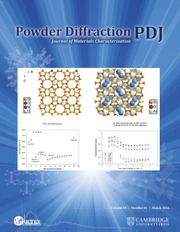Article contents
Quantitative powder diffraction phase analysis with a combination of the Rietveld method and the addition method
Published online by Cambridge University Press: 06 March 2012
Abstract
The Rietveld method can be combined with the addition method to determine the absolute quantities of the phases treated by Rietveld refinement plus the quantity of phase(s) not treated by it (amorphous or unobserved). If q is the added proportion of a defined phase already present in the sample, and a1 and a2 its relative proportions as determined by Rietveld refinement prior and after the addition, the proportion of the amorphous (untreated) phase(s) in the original sample is calculated as xo=[a2−(1−q)a1−q]/(1−q)(a2−a1). The absolute quantities of the phases treated by Rietveld refinement are then determined by a correction for the content of the amorphous phase(s), or they can be calculated directly from specific equations. The advantage of the method is that no new variables are introduced in the refinement when the added standard already is a part of the original mixture.
- Type
- Technical Articles
- Information
- Copyright
- Copyright © Cambridge University Press 2002
References
- 6
- Cited by


